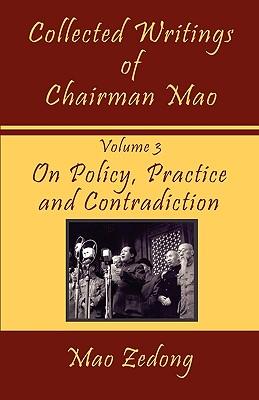
Book
Collected Writings of Chairman Mao: Volume 3 - On Policy, Practice and Contradiction
by Mao Zedong & Mao Tse-Tung
(Write a Review)
Paperback
$19.95
*Part 2 - On Practice
*Part 3 - On Contradiction
*Part 4 - On New Democracy
*Part 5 - On the Correct Handling of Contradictions among the People
Excerpt from Collected Writings of Chairman Mao - On Policy, Practice and Contradiction by Mao Zedong
Reprinted by permission. All rights reserved. Above all, Marxists regard man's activity in production as the most fundamental practical activity, the determinant of all his other activities. Man's knowledge depends mainly on his activity in material production, through which he comes gradually to understand the phenomena, the properties and the laws of nature, and the relations between himself and nature; and through his activity in production he also gradually comes to understand, in varying degrees, certain relations that exist between man and man. None of this knowledge can be acquired apart from activity in production. In a classless society every person, as a member of society, joins in common effort with the other members, enters into definite relations of production with them and engages in production to meet man's material needs. In all class societies, the members of the different social classes also enter, in different ways, into definite relations of production and engage in production to meet their material needs. This is the primary source from which human knowledge develops.
*Part 2 - On Practice
*Part 3 - On Contradiction
*Part 4 - On New Democracy
*Part 5 - On the Correct Handling of Contradictions among the People
Excerpt from Collected Writings of Chairman Mao - On Policy, Practice and Contradiction by Mao Zedong
Reprinted by permission. All rights reserved. Above all, Marxists regard man's activity in production as the most fundamental practical activity, the determinant of all his other activities. Man's knowledge depends mainly on his activity in material production, through which he comes gradually to understand the phenomena, the properties and the laws of nature, and the relations between himself and nature; and through his activity in production he also gradually comes to understand, in varying degrees, certain relations that exist between man and man. None of this knowledge can be acquired apart from activity in production. In a classless society every person, as a member of society, joins in common effort with the other members, enters into definite relations of production with them and engages in production to meet man's material needs. In all class societies, the members of the different social classes also enter, in different ways, into definite relations of production and engage in production to meet their material needs. This is the primary source from which human knowledge develops.
Paperback
$19.95